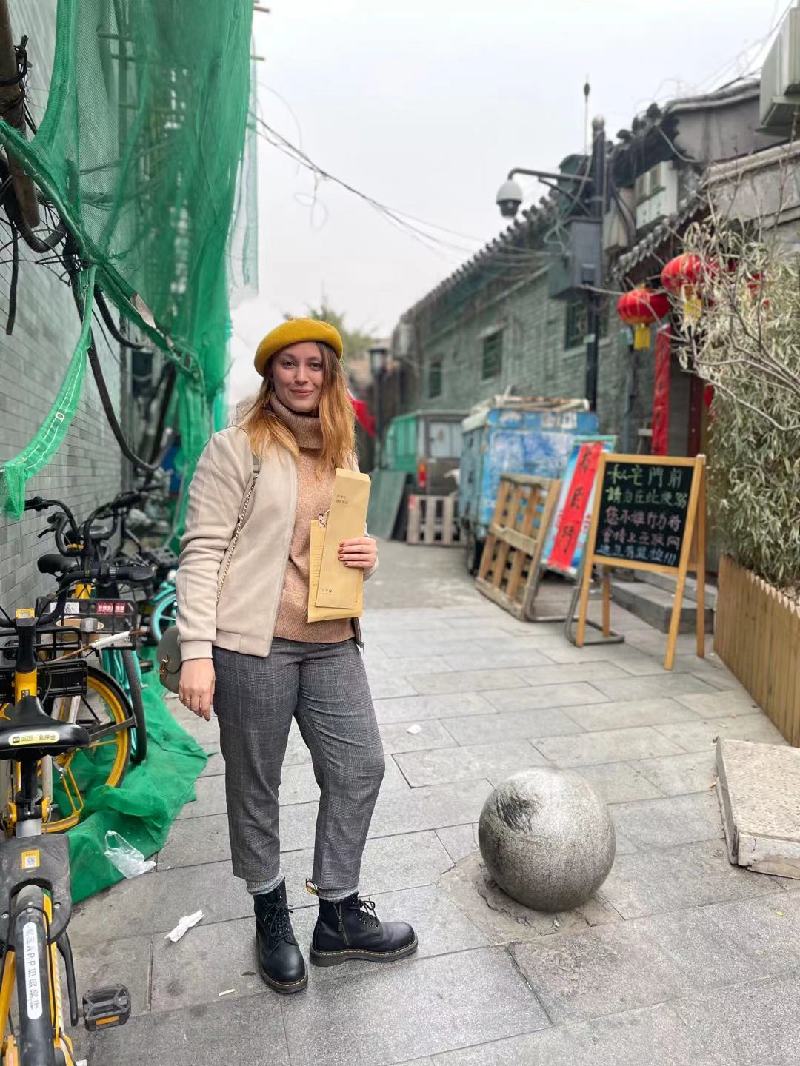


Chinese New Year exploring in the hutongs.
When I first moved to China it was a little bit like being underwater. Yes there was greenery and dirt and elements that were familiar to me, but they were mutated somehow, different. Trees that looked like the maple trees I grew up with had leaves three times the size. The birds that peppered the city like the pigeons of New York had entirely different flight patterns: spiraling up towards the sun then dropping like trick pilots into the grass. And like being underwater, I often felt voiceless, muffled somehow. It was difficult for me to express to the people around me the full extent of my foreignness. Even small things, the kinds of mugs I saw my coworkers using in the office, the chocolate bars in the grocery store, the cut of people's clothes, screamed to me that I was no longer somewhere familiar. That I could no longer rely on anything I knew.
Before I came to China (I am embarrassed to say) my closest understanding of the country came from movies like Mulan or Crouching Tiger Hidden Dragon. I grew up in a sleepy little town in Northeast America. Most people I grew up with didn't ever leave. And why would they? Fruitful farm lands, no traffic, long winding scenic commutes. This is the dream of small-town America. Live in a place where there's always enough of everything: food, gas, clothing. Feel safe and trust that in 30 years, hell 50, the world you love will still be there, just a little older but still populated with the same characters. There's an easiness to it; a luxury in being able to think without converting your words. You are able to talk as fast as you want and trust that the listener will pick up on your obscure movie references. You know that every restaurant you walk into will have coffee and that every clothing store will have pants in your size.
I love my home, deeply, painfully. I pine for it. But while I am there I cannot shake the feeling that there is something off about the picture. There is something in all that easiness that screams of imminent disaster. Something about all that familiarity that begs for adventure. From my mother's living room, the problems of the world (earthquakes in Sichuan, floods in New Orleans) seem far away. We may think about them for a time (feel the uneasiness of an uncertain world, worry about the future) but outside the sun is still shining and the cool rivers are still flowing. It is hard not to feel like whatever is happening in the world, is happening somewhere else, to people so far and so different it is hardly worth the effort to imagine them. Hardly worth the effort to humanize them.
But still news from the wider world creeps in: environmental disasters, political embarrassments, wars, revolutions, conferences, trips to outer space. And we hear about China. All sorts of things it can be difficult to make sense of. Images of this country on the far side of the world trickle into the background, escape from the mouths of our news anchors, slip into our TV shows and our songs. It is still a place that feels impossibly far away, but it’s closeness to us is growing. The global landscape is changing, and from the tags on our clothing to the agendas of our politicians, we feel it: China is out there and it is becoming increasingly necessary we try to understand it.
There's an uneasiness about this, like water slowly creeping up a shoreline. We know the world is changing, that eventually it might even reach our sleepy hollows in Northeast America; that maybe it already has. But for the average American, we don't exactly know how, or in what ways. So many of us do what feels to make the most sense. We drive our kids to school. We garden. We read the news. And we think sometimes, but only when it's necessary about the big world beyond. Maybe it's just too scary or too much: all that change out there in the big unknown. Maybe it's just that there's something uniquely North American in ‘minding your business.’ Still, whatever the reasons are, I find that impossible to do.
In an increasingly globalized world "our business" is everybody's business. And sitting at home while the world creeps up around me is like sitting at the edge of a forest fire waiting to burn. My instinct is to go out and look the world in the face. To run directly towards the things I don't understand. And in China, there are so many things I have yet to understand.

Reading books to elementary school students as captured by CCTV.
People ask me all the time what I am doing here. Whether it's my mother or my boss or the Didi driver or the bartender, I have never once been able to give a clear and honest answer. There is professional and financial opportunity for teachers like me and maybe a little chance involved. But there is something bigger too, impossible for me to articulate, even to myself.
The world back home is easy and makes sense, if I don't draw its edges too far. Here, even the birds don't make sense. The language is a labyrinth that feels like sand in my mouth. The rules of politeness are wholly unintuitive to me. Even the simple act of eating, of keeping myself alive and fed, is wrought with forced consciousness and the bravery of the unknown. But the unlikely truth is that here is the only place I don't feel like I'm hiding. Every time I leave my front door, I learn a million things, willingly and unwillingly. I don't have the option here, of hiding in the known and safe. I am forced to stand, eyes wide open, and take in all that wonderful strangeness, even when I'm tired, even when I'm scared. I'm out here in the deep water and it feels like proximity to truth.
Oddly enough it's this space, this truth space, where I feel the most comfortable. I have discovered that there is a deep bounty in this cosmos, at the place where what was foreign and what is familiar meet. If you want to know the world first you have to see her, as clear and as unobstructed as possible, only then can you love her. It's the same with her people. This process of learning, is a process of loving. It is difficult to humanize what you have never seen; what you don't understand.
Of all the changes in the growing world, all the worries, all the responsibilities, this is the thing that has troubled me the most: how difficult it can be for everyday people, east and west, to see each other clearly, to humanize, to understand. This process is not just a personal journey, it's a necessary task for anyone who wants to live clearly and lovingly in whatever world we are building together. There are big problems to be solved, but looking and listening is the first action. So here I am, in my 8th story apartment in Beijing, watching these foreign birds dart through these curious trees, feeling closeness and strangeness all at the same time, trying to see clearly.
Hailey Neal is a writer and teacher of writers who, in the most aggressive snowbird campaign in human history, splits her time between Beijing and Vermont. She has her bachelor's in professional writing and her master's in education. Her work has appeared in or is forthcoming in From Whispers to Roars, The Closed Eye Open, Ember Chasm Review, The Finger Literary Journal, Tempered Runes Press, 805 Lit, The Dillydoun Review, and the Beautiful Cadaver Soundcloud project. Alarmingly, she had to look up whether to capitalize "professional writing" for this bio. If you find any other typos in here, this is a test.
The views and opinions expressed in this article are those of the author's and do not necessarily reflect the position of GMW.cn.
点击右上角![]() 微信好友
微信好友
 朋友圈
朋友圈

请使用浏览器分享功能进行分享
